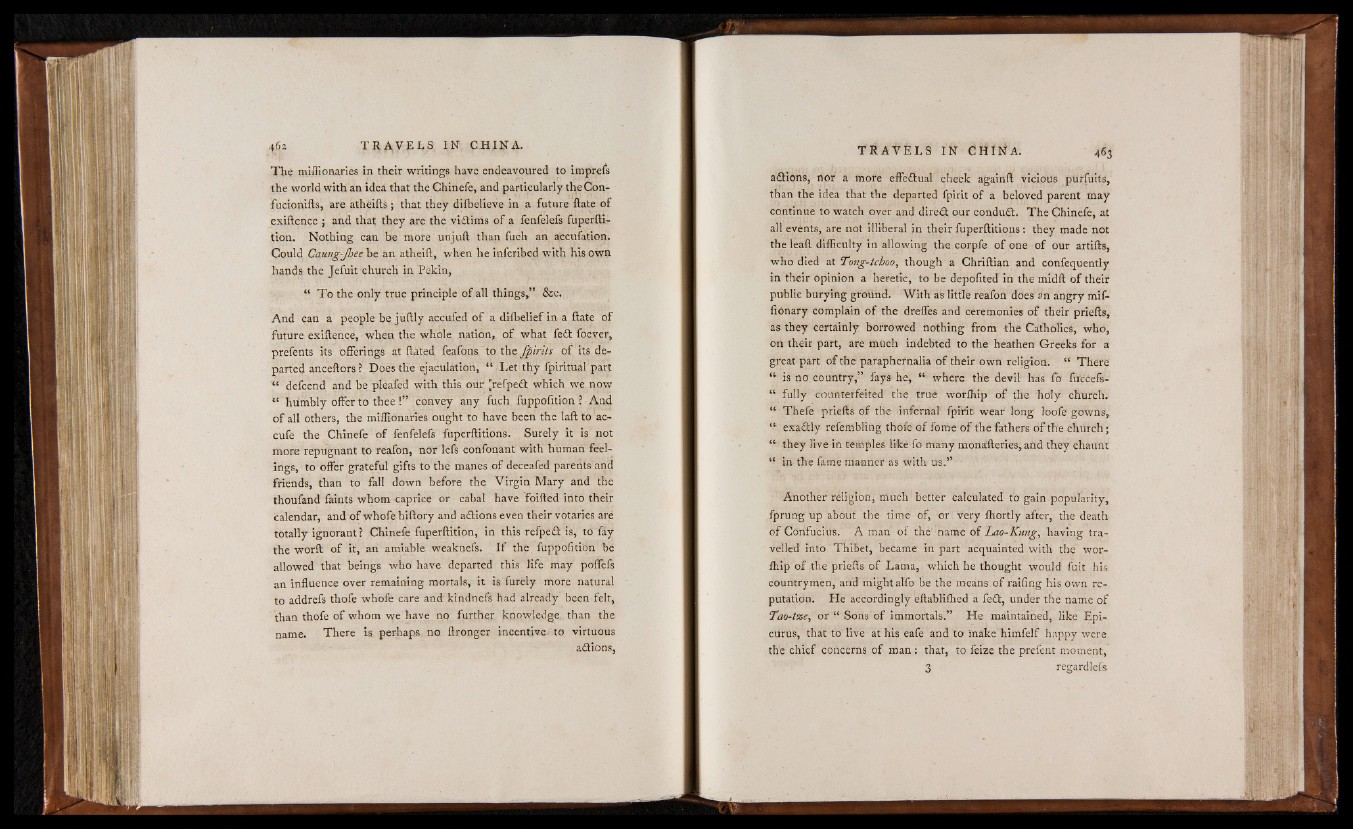
The miflionaries in their writings have endeavoured to imprefs
the world with an idea that the Chinefe, and particularly theCon-
fucionifts, are atheifts; that they diibelieve in a future ftate o f
exiftence ; and that they are the vidims o f a fenfelefs fuperfti-
tion. Nothing can be more unjuft than fuch an accufalion.
Could Caung-Jhee be an atheift, when he infcribed with his own
hands the Jefuit church in Pekin,
“ T o the only true principle o f all things,” & c.
And can a people be juftly accufed o f a diibelief in a ftate o f
future exiftence, when the whole nation, o f what fed foever,
prefents its offerings at ftated feafons to the fp irits o f its departed
anceftors? Does the ejaculation, “ Let thy fpiritual part
“ defcend and be pleafed with this our 'refped which we now
“ humbly offer to thee !” convey any fuch fuppofition ? And
o f all others, the miffionaries ought to have been the laft to'ac-
cufe the Chinefe o f fenfelefs fuperftitions. Surely it is not
more repugnant to reafon, nor lefs confonant with human feelings,
to offer grateful gifts to the manes o f deceafed parents and
friends, than to fall down before the Virgin Mary and the
thoufand faints whom caprice or cabal have foifted into their
calendar, and o f whofe hiftory and adions even their votaries are
totally ignorant ? Chinefe fuperftition, in this refped is, to fay
the worft o f it, an amiable weaknefs. I f the fuppofition be
allowed that beings who have departed this life may poffefs
an influence over remaining mortals, it is furely more natural
to addrefs thofe whofe care and kindnei'S had already been felt,
than thofe o f whom we have np further knowledge than the
name. There is perhaps no ftronger incentive to virtuous
adions,
adions, nor a more effedual check againft vicious purfuits,
than the idea that the departed fpirit o f a beloved parent may
continue to watch over and dired our condud. The Chinefe, at
all events, are not illiberal in their fuperftitions: they made not
the leaft difficulty in allowing the corpfe o f one o f our artifts,
who died at 'Tong-tchoo, though a Chriftian and confequently
in their opinion a heretic, to be depofited in the midft o f their
public burying ground. With as little reafon does an angry mif-
fionary complain o f the drefles and ceremonies o f their priefts,
as they certainly borrowed nothing from the Catholics, who,
on their part, are much indebted to the heathen Greeks for a
great part o f the paraphernalia o f their own religion. “ There
“ is no country,” fays he, “ where the devil has fo fuecefs-
“ fully counterfeited the true worfhip o f the holy' church.
“ Thefe priefts o f the infernal fpirit wear long loofe gowns,
“ exadly refembling thofe o f feme o f the fathers o f the church;
“ they live in temples like fo many monaifteries,and they chaunt
“ in the fame manner as with us.”
Another religion, much better calculated fo gain popularity,
fprung up about the time of, or very ihortly after, the death
df Confucius. A man of the' name o f I&o-Kung, having travelled
into Thibet, became in part acquainted with the wor-
fhip o f the priefts o f Lama, which he thought would fuit his
countrymen, and might alfo be the means o f railing his own reputation.
He accordingly ellabliihed a fed, under the name of
Tao-tze, or “ Sons o f immortals.” He maintained, like Epicurus,
that to live at his eafe and to make himfelf happy were
the chief concerns o f man: that, to feize the prefent moment,
3 regardlefs